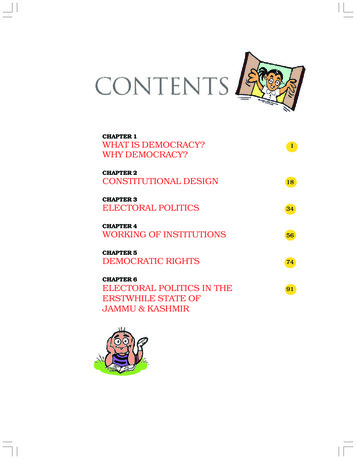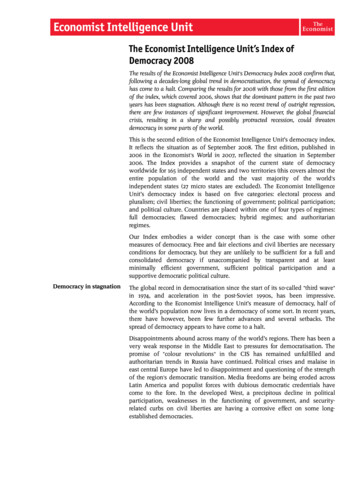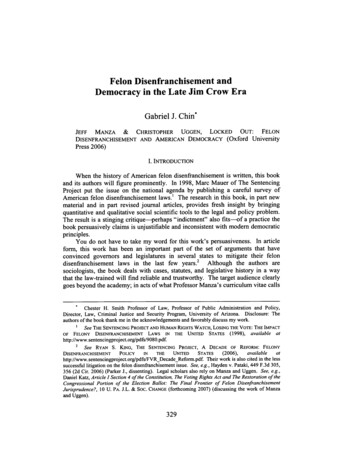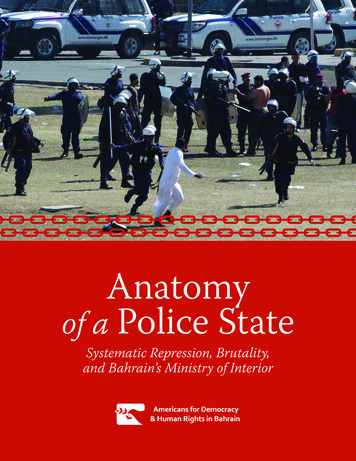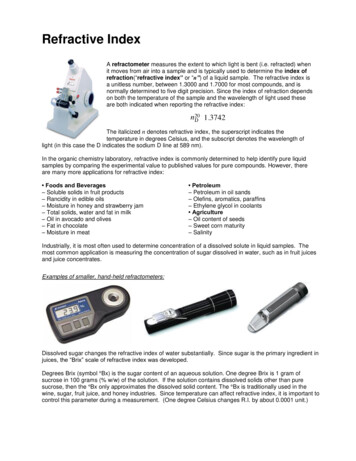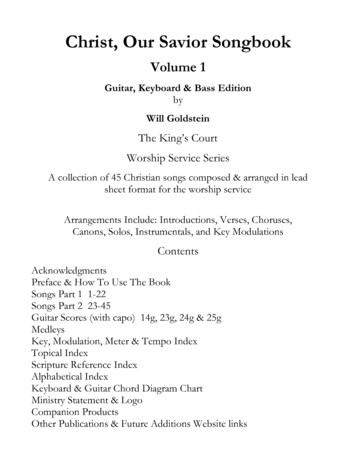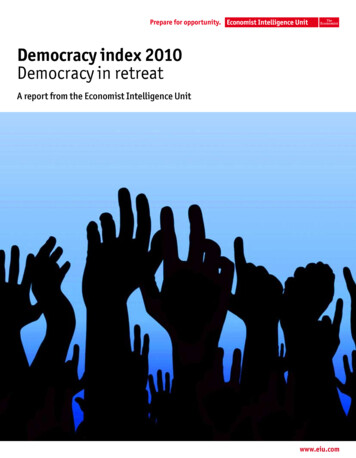
Transcription
Democracy index 2010Democracy in retreatA report from the Economist Intelligence Unitwww.eiu.com
Democracy index 2010Democracy in retreatThe Economist Intelligence Unit’s Index of Democracy 2010Democracy in retreatThis is the third edition of the Economist Intelligence Unit’s democracy index. It reflects thesituation as of November 2010. The first edition, published in The Economist’s The World in 2007,measured the state of democracy in September 2006 and the second edition covered the situationtowards the end of 2008. The index provides a snapshot of the state of democracy worldwide for165 independent states and two territories—this covers almost the entire population of the worldand the vast majority of the world’s independent states (micro states are excluded). The EconomistIntelligence Unit’s Index of Democracy is based on five categories: electoral process and pluralism;civil liberties; the functioning of government; political participation; and political culture.Countries are placed within one of four types of regimes: full democracies; flawed democracies;hybrid regimes; and authoritarian regimes.Free and fair elections and civil liberties are necessary conditions for democracy, but they areunlikely to be sufficient for a full and consolidated democracy if unaccompanied by transparentand at least minimally efficient government, sufficient political participation and a supportivedemocratic political culture. It is not easy to build a sturdy democracy. Even in long-establishedones, if not nurtured and protected, democracy can corrode.Democracy in declineThe global record in democratisation since the start of its so-called third wave in 1974, andacceleration after the fall of the Berlin Wall in 1989, has been impressive. According to theEconomist Intelligence Unit’s measure of demo cracy, one-half of the world’s population now livesin a democracy of some sort. However, there has been a decline in democracy across the world since2008. The decades-long global trend in democratisation had previously come to a halt in whatLarry Diamond (2008) called a “democratic recession”. Now democracy is in retreat. The dominantpattern in all regions over the past two years has been backsliding on previously attained progressin democratisation. The global financial crisis that started in 2008 accentuated some existingnegative trends in political development.Table 1Democracy index, 2010, by regime typeNo. of countries% of countries% of world populationFull democracies2615.612.3Flawed democracies5331.737.2Hybrid regimes3319.814.0Authoritarian regimes5532.936.5Note. “World” population refers to the total population of the 167 countries covered by the index. Since thisexcludes only micro states, this is nearly equal to the entire actual estimated world population in 2010.Source: Economist Intelligence Unit. The Economist Intelligence Unit Limited 2010
Democracy index 2010Democracy in retreatDisappointments abound across many of the world’s regions. Authoritarian trends have becomeeven more entrenched in the Middle East and much of the former Soviet Union. Democratisationin Sub-Saharan Africa is grinding to a halt, and in some cases is being reversed. A political malaisein east-central Europe has led to disappointment and questioning of the strength of the region’sdemocratic transition. Media freedoms are being eroded across Latin America and populist forceswith dubious democratic credentials have come to the fore in a few countries in the region. In thedeveloped West, a precipitous decline in political participation, weaknesses in the functioning ofgovernment and security-related curbs on civil liberties are having a corrosive effect on some longestablished democracies.Reversals in or erosion of democracy and rising disenchantment with the results of some politicalliberalisations appear to have a variety of causes. The pace of democratisation was bound to slowafter the “easy cases”—eager-to-liberalise east-central Europe after the fall of the Berlin Wall andAfrican regimes susceptible to outside pressure for political change. “Hard cases” such as China andMiddle East autocracies were always going to be a more difficult proposition. Autocrats have alsolearned how better to protect themselves; many of them preside over energy-rich states and havebeen strengthened by sustained high oil prices. A key factor is the delegitimation of much of thedemocracy-promotion agenda, which has been associated with military intervention and unpopularwars in Afghanistan and Iraq. A combination of double standards in foreign policy (autocrats canbe good friends as well as foes) and growing infringements of civil liberties has led to charges ofhypocrisy against Western states.Problems in the functioning of democracy in leading Western states diminish the scopefor credible external democracy promotion. The US and UK are near the bottom of the “fulldemocracy” category in our index. In the US, there has been an erosion of civil liberties relatedto the fight against terrorism. Problems in the functioning of government have also become moreprominent. In the UK, there has also been some erosion of civil liberties, but the main featureis an exceptionally low level of political participation across all dimensions—voting turnout,membership of political parties and willingness to engage in and attitudes to political activity.Although almost one-half of the world’s countries can be considered to be democracies, inour index the number of “full democracies” is low, at only 26 countries; 53 countries are rated as“flawed democracies”. Of the remaining 88 countries in our index, 55 are authoritarian and 33 areconsidered to be “hybrid regimes”. As could be expected, the developed OECD countries dominateamong full democracies, although there are two Latin American countries, one east Europeancountry and one African country, which suggests that the level of development is not a bindingconstraint. Only two Asian countries are represented: Japan and South Korea.One-half of the world’s population lives in a democracy of some sort, although only 12% residein full democracies. Some 2.5bn people, more than one-third of the world’s population, still livesunder authoritarian rule (with a large share being, of course, in China). The Economist Intelligence Unit Limited 2010
Democracy index 2010Democracy in retreatTable 2Democracy Index 2010Category scoresRankOverallscoreI Electoral processand pluralismII Functioningof governmentIII PoliticalparticipationIV Political cultureV Civil libertiesFull 8.899.389.71Sweden49.509.589.648.899.3810.00New 158.289.178.215.568.759.71Czech 69.587.866.118.139.12South .215.008.139.71Costa Rica 117.509.41Flawed democracies Cape 36.677.509.41Italy297.839.586.796.118.138.53South 146.117.508.53Slovenia327.699.587.146.676.258.82 The Economist Intelligence Unit Limited 2010
Democracy index 2010Democracy in retreatTable 2Democracy Index 2010Category scoresRank OverallscoreI Electoral processand pluralismII Functioningof governmentIII PoliticalparticipationIV Political cultureV Civil .219.586.075.006.888.53Jamaica 437.219.176.795.006.258.82Trinidad and nd487.059.586.076.114.389.12Latvia a 65.008.24Suriname546.659.176.434.445.008.24Sri ailand 576.557.836.075.566.257.06Papua New 27.505.565.637.06El 336.075.004.388.24Peru 895.638.24Serbia656.339.174.646.114.387.35 The Economist Intelligence Unit Limited 2010
Democracy index 2010Democracy in retreatTable 2Democracy Index 2010Category scoresRankOverallscoreI Electoral processand pluralismII Functioningof governmentIII PoliticalparticipationIV Political cultureV Civil libertiesMoldova ia696.235.255.366.675.638.24Dominican .06Guatemala 13.756.76Ghana 635.88Hybrid regimes Hong Kong805.923.505.364.446.889.41Bolivia gua e935.447.832.868.334.383.82Bosnia and 85.88Liberia975.077.830.795.565.006.18 The Economist Intelligence Unit Limited 2010
Democracy index 2010Democracy in retreatTable 2Democracy Index 2010Category scoresRankOverallscoreI Electoral processand pluralismII Functioningof governmentIII PoliticalparticipationIV Political cultureV Civil ra Leone1054.517.001.862.785.635.29Kyrgyz Iraq 1114.004.330.796.113.755.00Authoritarian regimes 45.634.41Fiji1193.620.422.863.335.006.47Burkina oon1263.411.174.292.785.003.82Comoros 83.754.71Gambia 1283.382.174.292.225.003.24 The Economist Intelligence Unit Limited 2010
Democracy index 2010Democracy in retreatTable 2Democracy Index 2010Category scores RankOverallscoreI Electoral processand pluralismII Functioningof governmentIII PoliticalparticipationIV Political cultureV Civil .785.003.53Côte .384.12Congo 2.94Tunisia 3.335.632.94Yemen ria 1.115.002.65Dem Rep of .24Libya1581.940.002.141.115.001.47Iran 1581.940.003.212.222.501.76Equatorial Guinea1601.840.000.791.675.001.76Saudi Arabia 1601.840.002.861.113.751.47Central African Republic1621.821.751.071.112.502.65 The Economist Intelligence Unit Limited 2010
Democracy index 2010Democracy in retreatTable 2Democracy Index 2010Category scoresRankOverallscoreI Electoral processand pluralismII Functioningof governmentIII PoliticalparticipationIV Political cultureV Civil North Korea1671.080.002.501.671.250.00Source: Economist Intelligence UnitLooking at the regional distribution of regime types, flawed democracies are concentrated inLatin America and eastern Europe, and to a lesser extent in Asia. Despite progress in Latin Americandemocratisation in recent decades, many countries in the region remain fragile democracies. Levelsof political participation are generally low and democratic cultures are weak. There has also beensignificant backsliding in recent years in some areas such as media freedoms.Much of eastern Europe illustrates the difference between formal and substantive democracy.The new EU members from the region have pretty much equal levels of political freedoms and civilliberties as the old developed EU, but lag significantly in political participation and political culture—areflection of widespread anomie and weaknesses of democratic development. Only one country fromthe region, the Czech Republic, is rated a full democracy.Changes between 2008 and 2010Many of the world’s authoritarian regimes are in the Middle East and North Africa (although there isalso a fair number in Asia, the former Soviet Union and Sub-Saharan Africa). The dearth of democraticregimes in the Middle East and North Africa is a well-known phenomenon, with much debate aboutthe causes. In the statistical relationship between democracy and income discussed below, a dummyvariable for the Middle East and North Africa is negative and highly significant statistically even whenoil wealth is included in our 167-country sample—that is, the Middle East and North Africa has muchlower levels of democratisation than could be inferred on the basis of income levels.The rollback in democracy is also part of an underlying trend that has been evident for some time,but has strengthened. Between 2006 (the year of the first issue of the index) and 2008 there wasstagnation; over the past two years, between 2008 and 2010, there has been outright decline. In allregions, the average democracy score for 2010 is lower than in 2008. The democracy score was lowerin 2010 than in 2008 in 91 countries out of the 167 covered by the Index, although in the majority ofthese the deterioration was modest. The score increased, at least marginally, in 48 countries, and itstayed the same in 28 countries over this period. The most pronounced decline was in eastern Europe.In 19 countries of eastern Europe, the democracy score declined between 2008 and 2010. The Economist Intelligence Unit Limited 2010
Democracy index 2010Democracy in retreatTable 3Democracy across the regionsNo. ofcountriesDemocracy 000North AmericaWestern Europe2010218.45164102008218.6119110Eastern Europe2010285.55115662008285.6721466Latin America & the 10772008285.5841086Asia & AustralasiaMiddle East & North b-Saharan 20081675.5530503651Source: Economist Intelligence Unit.In 13 countries there was a change in regime type between 2008 and 2010; in 11 of thesethere was regression. France, Italy, Greece and Slovenia dropped from the category of fulldemocracies to flawed democracies. In addition to these four European countries thatregressed from full to flawed democracies, three countries moved from flawed to hybridregimes and four from hybrid to authoritarian regimes. Only in two cases, both in SubSaharan Africa, was there an advance—Ghana and Mali moved from hybrid regimes to flaweddemocracies.A noticeable decline in media freedoms in recent years, affecting all regions to some extent,has accelerated since 2008. This has affected mainly electronic media, which is often under The Economist Intelligence Unit Limited 2010
Democracy index 2010Democracy in retreatstate control or heavy state influence—although repression and infringements of the freedom ofexpression have also extended to the print media and, most recently, the Internet.In 36 countries there was a deterioration in scores for media freedom between 2008 and 2010.This included three countries in western Europe (France, Italy, Turkey), eight in eastern Europe(Albania, Azerbaijan, Hungary, Macedonia, Montenegro, Romania, Russia and Serbia), nine in LatinAmerica (Argentina, Bolivia, Colombia, Ecuador, Guyana, Mexico, Honduras, Nicaragua and Peru),four in the Middle East and North Africa (Iran, Egypt, Palestinian Territories and Saudi Arabia),four in Asia &Australasia (Fiji, Malaysia, Sri Lanka and Thailand), and eight in Sub-Saharan Africa(Angola, Burundi, Cameroon, Congo Brazzaville, Democratic Republic of Congo, Equatorial Guinea,Madagascar and Rwanda).The reasons for this decline are complex and varied. Underlying negative trends appear to havebeen exacerbated by the post-2008 economic crisis. Many governments have felt increasinglyvulnerable and threatened and have reacted by intensifying their efforts to control the media andimpede free expression. Increasing unemployment and job insecurity have fostered a climate of fearand self-censorship among journalists in many countries. The concentration of media ownershiphas tended to increase, which has had a negative impact on the diversity of views and the freedomof expression. Advanced nations have become more inward-looking and hence less interested andcapable of monitoring and pressurising emerging market governments to ensure freedom of thepress. In authoritarian regimes, which have often become stronger and more confident, state controland repression of any independent media is a given and has if anything tended to get worse, withincreasing attacks on independent journalists.Table 4Democracy Index 2008 and 20102010 Overallscore2008 OverallscoreRankDifference in scoresbetween 2010 and2008178.2218-0.0499.07110.01RankNorth AmericaUS8.18Canada9.08Western y8.38148.8213-0.44Greece7.92288.1322-0.21 The Economist Intelligence Unit Limited 2010
Democracy index 2010Democracy in retreatTable 4Democracy Index 2008 and 2010Rank2008 OverallscoreRankDifference in scoresbetween 2010 8-0.06Turkey5.73895.69870.04United Kingdom8.16198.15210.01845.9181-0.052010 OverallscoreIcelandEastern snia and .18Croatia6.81537.0451-0.24Czech akhstan3.301323.45127-0.16Kyrgyz 16Poland7.05487.3045-0.25Romania6.60567.0650-0.46 The Economist Intelligence Unit Limited 2010
Democracy index 2010Democracy in retreatTable 4Democracy Index 2008 and 2010Rank2008 OverallscoreRankDifference in scoresbetween 2010 a7.35387.33440.02Slovenia7.69327.9630-0.272010 1-0.27Latin 00.01Costa n Republic6.20706.20730.00Ecuador5.77875.64880.14El 6.31700.09Suriname6.65546.58590.07Trinidad and zuela5.18965.3495-0.15 The Economist Intelligence Unit Limited 2010
Democracy index 2010Democracy in retreatTable 4Democracy Index 2008 and 20102010 OverallscoreRank2008 OverallscoreRankDifference in scoresbetween 2010 and2008138-0.54Asia and 360.10Fiji3.621195.11100-1.50Hong 051150.20New Zealand9.2659.1970.07North apua New ingapore5.89825.89820.00South Korea8.11208.01280.11Sri nam2.941402.531490.421330.12Middle East & North 1Egypt3.071383.89119-0.82 The Economist Intelligence Unit Limited 2010
Democracy index 2010Democracy in retreatTable 4Democracy Index 2008 and 2010Rank2008 OverallscoreRankDifference in scoresbetween 2010 and20081.941582.83145-0.894.001114.001160.002010 935.8385-0.38Qatar3.091372.921440.18Saudi ited Arab 21313.35131-0.03Sub-Saharan 3357.47390.16Burkina meroon3.411263.46126-0.05Cape Verde7.94277.81340.13Central African omoros3.411263.58123-0.17Congo (Brazzaville)2.891422.94143-0.06Democratic Republic of Congo2.151552.28154-0.13Côte 2-0.16Equatorial Guinea1.841602.19155-0.35 The Economist Intelligence Unit Limited 2010
Democracy index 2010Democracy in retreatTable 4Democracy Index 2008 and 20102010 OverallscoreRank2008 OverallscoreRankDifference in scoresbetween 2010 -0.45Senegal5.27955.3793-0.10Sierra Leone4.511054.111120.40South 2.641462.531480.11Source: Economist Intelligence Unit15 The Economist Intelligence Unit Limited 2010
Democracy index 2010Democracy in retreatDemocracy and developmentThe relationship between the level of development (income per head) and democracy is not clearcut. There is an apparent association: the simple correlation between our democracy index for2010 and the logarithm of GDP per head (at PPP US ) in 2010 is just under 0.6. This may lookeven surprisingly low—it implies that in a simple two-variable regression of the democracy indexon income per head, just one-third of the inter-country variation in democracy is explained byincome levels. If we also include a measure of oil wealth (with a so-called dummy variable thattakes a value of 1 for major oil-exporting countries and 0 otherwise), the explanatory power ofthe regression increases sharply to some 60% of the inter-country variation in the democracyindex. Although this still leaves almost 40% of the variation unexplained, it illustrates the oftenobserved strong negative impact on democratic development of a reliance on oil wealth.However, the direction of causality between democracy and income is also debatable. Thestandard modernisation hypothesis that economic development leads to, and/or is a necessarypre-condition for democracy, is no longer universally accepted. Instead, it has been argued thatthe primary direction of causation runs from democracy to income (Rigobon and Rodrik 2005;Acemoglu et al 2005).Shifts in regime typeDowngradesFrance—full democracy to flawed democracyVarious negative political trends in France inrecent years have resulted in the country beingdowngraded to the flawed democracy category.Public confidence in political parties and thegovernment is extremely low. Surveys alsoshow that citizens’ engagement with politicshas declined. The degree of popular support fordemocracy is among the lowest in the developedworld. One in seven do not agree that democracyis better than any other form of government.The chasm between the country’s citizens and itspolitical elites has widened. Outbreaks of violentrioting in recent years are another symptom ofthe country’s political malaise. Under the Frenchpolitical system, the president wields hugepower. The autocratic and domineering style ofthe current president, Nicolas Sarkozy, threatensto undermine democratic traditions. There hasbeen increasing anti-Muslim sentiment and16emphasis on the country’s Christian roots duringthe Sarkozy presidency. Pressure on journalistsand the electronic media have led to a decline inmedia freedoms.Italy—full democracy to flawed democracySince the prime minister, Silvio Berlusconi,returned to power in 2008, the media situation hasdeteriorated significantly. In addition to owningand controlling Mediaset, which comprises threenational television channels, Mr Berlusconi alsohas indirect control over RAI, the state broadcaster.RAI 1, the state channel with the largest audience,has repeatedly chosen to limit coverage of, orcompletely ignore, negative news about MrBerlusconi or his close associates. There has alsobeen political pressure on RAI to cancel or curtailseveral popular left-leaning programmes for theircriticism of Mr Berlusconi and his government.Greece—full democracy to flawed democracyGreece already had low scores for the categoriesof government functioning and political culture.For some years there has been a high level ofperceived corruption, causing public confidencein the country’s institutions to decline. The Greek The Economist Intelligence Unit Limited 2010
Democracy index 2010Democracy in retreateconomic crisis has revealed that the flaws in thetransparency and accountability of governmentin Greece are even deeper than had beenpreviously supposed. A significant deteriorationin the functioning of government category hasled Greece to being downgraded to the flaweddemocracy category.Slovenia—full democracy to flawed democracySlovenia was previously one of only two countries ineastern Europe that was considered a full democracy(in addition to the Czech Republic). In 2008Slovenia ranked 30th out of 167 countries, puttingit at the bottom of the list of full democracies.Slovenia’s relatively strong position owes muchto its high scores in the electoral process and civilliberties categories. In these areas it compareswell with some long-established democracies.However, political participation in Slovenia hasbeen declining and there is widespread popularapathy and disaffection with the political elite.In recent years, there has been an extraordinarydeterioration in a range of attitudes associatedwith democracy, In particular, surveys show asharp decline in public confidence and trust inpolitical institutions (political parties, governmentand parliament). Scarcely more than one-thirdof Slovenes are satisfied with the way democracyfunctions in their country—a significantly lowerproportion than in any west Europe
The Economist Intelligence Unit's Index of Democracy 2010 Democracy in retreat This is the third edition of the Economist Intelligence Unit's democracy index. It reflects the situation as of November 2010. The first edition, published in The Economist's The World in 2007,

